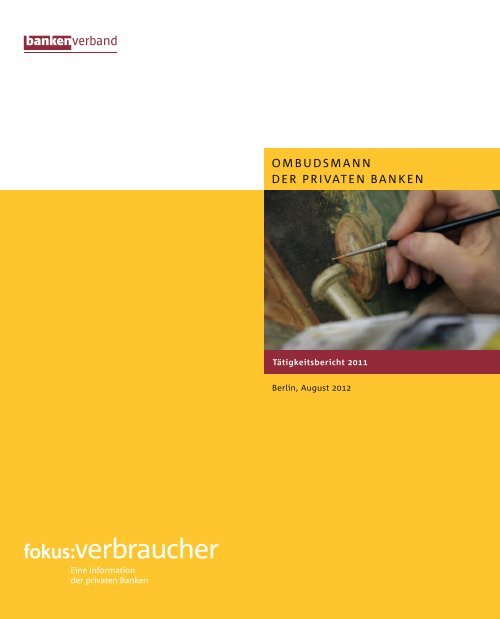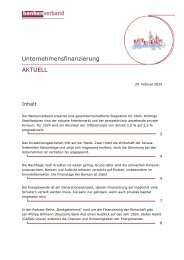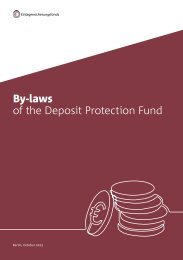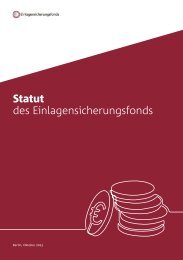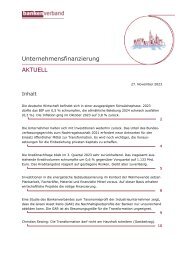Summary of the Ombudsman´s Report 2011
In 2012 we celebrate the 20th Anniversary of the German private commercial banks´ Ombudsman Scheme. When it launched its Ombudsman Scheme in 1992, making it the first leading German financial-sector association to do so.
In 2012 we celebrate the 20th Anniversary of the German private commercial banks´ Ombudsman Scheme. When it launched its Ombudsman Scheme in 1992, making it the first leading German financial-sector association to do so.
You also want an ePaper? Increase the reach of your titles
YUMPU automatically turns print PDFs into web optimized ePapers that Google loves.
Ombudsmann<br />
der privaten Banken<br />
Tätigkeitsbericht <strong>2011</strong><br />
Berlin, August 2012
102 ombudsmann der privaten banken – tätigkeitsbericht <strong>2011</strong><br />
6 <strong>Summary</strong> <strong>of</strong> <strong>the</strong> Ombudsman’s <strong>Report</strong> <strong>2011</strong><br />
20th Anniversary <strong>of</strong> <strong>the</strong> German private<br />
commercial banks’ Ombudsman Scheme<br />
Praise <strong>the</strong> ripe field, not <strong>the</strong> green corn.<br />
(Irish saying)<br />
Out-<strong>of</strong>-court dispute resolution is in great demand in Germany.<br />
Not only <strong>the</strong> central associations represented in <strong>the</strong> German<br />
Banking Industry Committee (GBIC) but also o<strong>the</strong>r financialsector<br />
associations and industries beyond <strong>the</strong> financial markets<br />
have recently set up dispute resolution schemes. It has by no<br />
means always been standard practice for trade associations to<br />
<strong>of</strong>fer <strong>the</strong>ir members’ customers a way <strong>of</strong> settling differences<br />
<strong>of</strong> opinion in day-to-day business with one ano<strong>the</strong>r. When<br />
it launched its Ombudsman Scheme in 1992, making it <strong>the</strong><br />
first leading German financial-sector association to do so,<br />
<strong>the</strong> Association <strong>of</strong> German Banks did not only earn plaudits.<br />
Initially, its ombudsman was labelled by some as a “homer”<br />
(i.e. biased in favour <strong>of</strong> banks). The distrust reflected in such<br />
a tag soon subsided, however.<br />
The private commercial banks’ first ombudsman 10) , <strong>the</strong> late<br />
Leo Parsch, former president <strong>of</strong> <strong>the</strong> Bavarian Constitutional<br />
Court and Munich Higher Regional Court, quickly made clear<br />
what <strong>the</strong> ombudsman’s job is about: adjudicating disputes<br />
between banks and customers that would o<strong>the</strong>rwise have to be<br />
settled before a court <strong>of</strong> law as quickly and unbureaucratically<br />
as possible, but on <strong>the</strong> basis <strong>of</strong> applicable law and also with<br />
binding effect for banks up to a certain amount. Both sides<br />
were to gain – banks, by having more chance <strong>of</strong> retaining<br />
customer loyalty even in <strong>the</strong> event <strong>of</strong> disputes, thanks to <strong>the</strong><br />
intervention <strong>of</strong> an impartial third party, and customers, by<br />
having more chance <strong>of</strong> fair resolution <strong>of</strong> a dispute without<br />
<strong>the</strong>ir legal position being adversely affected in any way by<br />
ombudsman proceedings. In short, <strong>the</strong> aim was a service<br />
directly benefiting customers “without any strings attached”.<br />
This has been <strong>the</strong> guiding idea behind <strong>the</strong> ombudsmen’s work<br />
ever since.<br />
The steadily – and in some cases sharply – rising number <strong>of</strong><br />
disputes requiring resolution shows clearly that this service<br />
is being used more and more <strong>of</strong>ten and more and more<br />
readily. This means that public awareness <strong>of</strong> <strong>the</strong> Ombudsman<br />
Scheme is still continuing to grow twenty years after its<br />
introduction. The private commercial banks have always<br />
faced up to <strong>the</strong> increasing demands that this brings with it:<br />
following <strong>the</strong> launch <strong>of</strong> <strong>the</strong> Ombudsman Scheme in 1992 with<br />
just one ombudsman, a total <strong>of</strong> seven ombudsmen now work<br />
untiringly to resolve disputes. The same goes for <strong>the</strong> Customer<br />
Complaints Office, which supports <strong>the</strong> ombudsmen and which<br />
has also been staffed accordingly to meet <strong>the</strong> continuously<br />
growing demands.<br />
A key feature <strong>of</strong> <strong>the</strong> Ombudsman Scheme, which is designed<br />
to give as many bank customers as possible easy “access<br />
to justice” outside a court <strong>of</strong> law, is <strong>the</strong> central role <strong>of</strong> <strong>the</strong><br />
ombudsmen. It is <strong>the</strong>y who use <strong>the</strong> legal expertise <strong>the</strong>y possess<br />
as former senior high court judges and justice ministry <strong>of</strong>ficials<br />
10) Irrespective <strong>of</strong> whe<strong>the</strong>r <strong>the</strong> Association <strong>of</strong> German Banks appoints ombudsmen or ombudswomen, <strong>the</strong> term “ombudsman” is used in Ombudsman<br />
Scheme Rules <strong>of</strong> Procedure for simplicity’s sake.
ankenverband 103<br />
to directly adjudicate cases <strong>the</strong>mselves or to seek an amicable<br />
settlement by means <strong>of</strong> a compromise between <strong>the</strong> parties<br />
involved. Three things are responsible for <strong>the</strong> success <strong>of</strong> <strong>the</strong><br />
private commercial banks’ Ombudsman Scheme: competence,<br />
independence and binding adjudication.<br />
Twenty years <strong>of</strong> experience and <strong>the</strong> feedback from many<br />
quarters show that this is <strong>the</strong> right concept. In <strong>the</strong> meantime,<br />
many o<strong>the</strong>r trade associations have followed <strong>the</strong> Association <strong>of</strong><br />
German Banks’ lead, although not all <strong>the</strong> schemes established<br />
stand critical comparison. After all, <strong>the</strong> aforementioned criteria<br />
– competence, independence and binding adjudication – are<br />
not customary everywhere, not even in <strong>the</strong> banking sector.<br />
These criteria are becoming more and more important,<br />
however: a directive on out-<strong>of</strong>-court dispute resolution<br />
schemes currently being debated by <strong>the</strong> EU legislative bodies<br />
will regulate much <strong>of</strong> what is still best practice today on a<br />
legally binding basis. While it will have to be ensured that<br />
this directive does not overshoot <strong>the</strong> mark (e.g. by setting<br />
over-tight rules also on <strong>the</strong> time allowed for handling complex<br />
cases, which are more <strong>the</strong> rule than <strong>the</strong> exception in banking<br />
business), <strong>the</strong> trend is moving in <strong>the</strong> right direction.<br />
Anniversaries are first and foremost an opportunity for a look<br />
back at, and an appreciation <strong>of</strong>, what has been achieved. The<br />
private commercial banks’ ombudsmen would not be doing<br />
<strong>the</strong>ir job if <strong>the</strong>y did not take a look forward as well at <strong>the</strong> same<br />
time. It is obvious that <strong>the</strong> demands made on <strong>the</strong> scheme<br />
operated by <strong>the</strong> private commercial banks have increased. This<br />
is shown by <strong>the</strong> steadily growing number <strong>of</strong> complaints, which<br />
repeatedly poses new challenges to <strong>the</strong> ombudsman team. For<br />
example, complaints concerning highly complex cases where<br />
<strong>the</strong> amount in dispute runs into millions <strong>of</strong> euros are also filed.<br />
The ombudsmen will continue to meet <strong>the</strong>se challenges in <strong>the</strong><br />
future as well. At <strong>the</strong> same time, <strong>the</strong> right conclusions need<br />
to be drawn from <strong>the</strong> outcome <strong>of</strong> ombudsman proceedings –<br />
both by banks and by customers.<br />
Private industry dispute resolution schemes are now<br />
indispensable if <strong>the</strong> acceptance <strong>of</strong> <strong>the</strong> legal system for settling<br />
both disputes involving small amounts and (supposedly)<br />
simpler legal questions as well is to be effectively supported.<br />
The role <strong>of</strong> <strong>the</strong> businesses financing <strong>the</strong> schemes should not<br />
be overlooked. Without <strong>the</strong>ir conviction and contribution, all<br />
this would be inconceivable. And this, too, is an important part<br />
<strong>of</strong> <strong>the</strong> success story written by <strong>the</strong> private commercial banks’<br />
Ombudsman Scheme.<br />
Thanks are due, ultimately, to <strong>the</strong> ombudsmen <strong>the</strong>mselves.<br />
With <strong>the</strong>ir competence, independence and extraordinary<br />
commitment, <strong>the</strong>y have helped to mediate between customers<br />
and <strong>the</strong>ir banks and to settle both simple and extremely<br />
complex complaints on <strong>the</strong> basis <strong>of</strong> applicable law, but also<br />
with a clear focus on pragmatic resolution. All those concerned<br />
are indebted to <strong>the</strong>m.
104 ombudsmann der privaten banken – tätigkeitsbericht <strong>2011</strong><br />
1. The Ombudsman Scheme<br />
a. Out-<strong>of</strong>-court dispute resolution<br />
As an alternative to <strong>the</strong> <strong>of</strong>ten inconvenient, time-consuming<br />
and expensive option <strong>of</strong> legal action, Germany’s private<br />
commercial banks <strong>of</strong>fer <strong>the</strong>ir customers a widely accepted,<br />
effective procedure whereby disputes are adjudicated<br />
unbureaucratically and quickly by an independent, impartial<br />
person – an ombudsman. The Ombudsman Scheme is<br />
designed primarily for consumers, but it is also open to<br />
firms and pr<strong>of</strong>essionals to handle disputes about credit<br />
transfers or misuse <strong>of</strong> payment cards. Details <strong>of</strong> how <strong>the</strong><br />
scheme works are set out in <strong>the</strong> Rules <strong>of</strong> Procedure approved<br />
by <strong>the</strong> Federal Ministry <strong>of</strong> Justice for <strong>the</strong> settlement <strong>of</strong><br />
customer complaints in <strong>the</strong> German private commercial<br />
banking sector, which are printed in <strong>the</strong> Appendix to <strong>the</strong><br />
Ombudsman’s <strong>Report</strong>.<br />
The benefits <strong>of</strong> this modern dispute resolution scheme are<br />
obvious: <strong>the</strong> scheme is free <strong>of</strong> charge to bank customers and<br />
does not involve any risks for <strong>the</strong>m. If <strong>the</strong>y do not accept <strong>the</strong><br />
ombudsman’s decision, <strong>the</strong>y are still free to go to a court <strong>of</strong><br />
law. They cannot lose out by forfeiting <strong>the</strong>ir claims under<br />
<strong>the</strong> statutory limitation period during <strong>the</strong> ombudsman<br />
proceedings. If <strong>the</strong>ir complaint to <strong>the</strong> ombudsman is upheld,<br />
<strong>the</strong>y obtain redress quickly and easily. The private commercial<br />
banks have undertaken to accept ombudsman decisions in<br />
disputes involving amounts up to €5,000. This binding effect<br />
<strong>of</strong> ombudsman adjudication should not be taken for granted;<br />
it is not standard practice in dispute resolution schemes<br />
operated by <strong>the</strong> business sector on a voluntary basis.<br />
Experience has shown that banks <strong>of</strong>ten accept ombudsman<br />
decisions against <strong>the</strong>m even where disputes involve amounts<br />
exceeding €5,000.<br />
b. The ombudsmen<br />
The high level <strong>of</strong> public acceptance that <strong>the</strong> private commercial<br />
banks’ Ombudsman Scheme enjoys is due to a great extent to<br />
<strong>the</strong> quality <strong>of</strong> <strong>the</strong> ombudsmen <strong>the</strong>mselves. These are former<br />
senior judges or legal pr<strong>of</strong>essionals whose personality and<br />
proven expertise ensure impartial proceedings:<br />
• Ekkehard Bombe, former judge at <strong>the</strong> Constitutional<br />
Court <strong>of</strong> Hesse and president <strong>of</strong> <strong>the</strong> Wiesbaden Regional<br />
Court<br />
• Horst-Die<strong>the</strong>r Hensen, former vice-president <strong>of</strong> <strong>the</strong><br />
Hanseatic Higher Regional Court, Hamburg<br />
• Angelika Lange, former deputy presiding judge at <strong>the</strong><br />
Frankfurt am Main Higher Regional Court<br />
• Dr Rainer Mößinger, former president <strong>of</strong> <strong>the</strong> Hanau<br />
Regional Court and deputy member <strong>of</strong> <strong>the</strong> Constitutional<br />
Court <strong>of</strong> Hesse<br />
• Dr Gerda Müller, former vice-president and presiding<br />
judge at <strong>the</strong> Federal Court <strong>of</strong> Justice<br />
• Dr Gerhart Kreft, former presiding judge at <strong>the</strong> Federal<br />
Court <strong>of</strong> Justice<br />
• Werner Weiß, former senior justice ministry <strong>of</strong>ficial<br />
in Bavaria and presiding judge at <strong>the</strong> Munich Higher<br />
Regional Court
ankenverband 105<br />
c. Management <strong>of</strong> complaints<br />
A Customer Complaints Office was set up at <strong>the</strong> Association<br />
<strong>of</strong> German Banks as a gateway to <strong>the</strong> Ombudsman Scheme.<br />
Any customer <strong>of</strong> a private commercial bank can contact<br />
this <strong>of</strong>fice in writing if <strong>the</strong>y feel that <strong>the</strong>y have been treated<br />
unfairly by <strong>the</strong>ir bank. All <strong>the</strong>y have to do is give a brief<br />
account <strong>of</strong> <strong>the</strong> facts <strong>of</strong> <strong>the</strong> matter, enclosing copies <strong>of</strong> <strong>the</strong><br />
required documents (e.g. cash account or securities account<br />
statements). Complaints in English and French submitted by<br />
customers resident abroad are also processed; in this case,<br />
however, <strong>the</strong> ombudsman proceedings can take longer, as<br />
translations may be required. A fully intended consequence<br />
<strong>of</strong> <strong>the</strong> introduction <strong>of</strong> <strong>the</strong> Ombudsman Scheme is that most<br />
private commercial banks have set up schemes <strong>of</strong> <strong>the</strong>ir own<br />
to handle customer complaints. These in-house complaintsettlement<br />
schemes have been a success. A large number<br />
<strong>of</strong> complaints do not need to be settled by an ombudsman.<br />
In many cases, simply explaining banking procedures or<br />
sometimes complex and abstract banking transactions takes<br />
care <strong>of</strong> any disputes in advance.
106 ombudsmann der privaten banken – tätigkeitsbericht <strong>2011</strong><br />
2. Statistics<br />
a. General trend in <strong>the</strong> year under review<br />
On 31 December <strong>2011</strong>, <strong>the</strong> number <strong>of</strong> complaints against<br />
member banks totalled 8,268, hitting a new high since <strong>the</strong><br />
launch <strong>of</strong> <strong>the</strong> Ombudsman Scheme. This figure had initially<br />
evolved no differently than in previous years. In fact, at <strong>the</strong><br />
end <strong>of</strong> November, <strong>the</strong> number <strong>of</strong> complaints recorded by<br />
<strong>the</strong> Customer Complaints Office had dropped slightly, to<br />
around 5,300. However, in <strong>the</strong> second half <strong>of</strong> December<br />
<strong>2011</strong>, around 2,800 complaints were received, meaning an<br />
overall increase <strong>of</strong> 22% compared with 2010.<br />
This sharp increase is due to a transitional provision (Article<br />
229 (6)) in <strong>the</strong> 2001 German Act to Modernise <strong>the</strong> Law on<br />
Obligations shortening <strong>the</strong> standard statutory limitation<br />
period <strong>of</strong> 30 years to 3 years. This transitional provision<br />
barred existing claims under <strong>the</strong> statute <strong>of</strong> limitations as<br />
<strong>of</strong> 31 December <strong>2011</strong> at <strong>the</strong> latest. Since <strong>the</strong> statutory<br />
limitation period for complainants’ claims is suspended<br />
for <strong>the</strong> duration <strong>of</strong> ombudsman proceedings, many claims<br />
were filed with <strong>the</strong> aim <strong>of</strong> delaying limitation.<br />
Total number <strong>of</strong> complaints received by <strong>the</strong><br />
Ombudsman Scheme 2007–<strong>2011</strong><br />
9,000<br />
8,268<br />
7,000<br />
6,514 6,494<br />
5,000<br />
4,837<br />
3,610<br />
3,000<br />
0<br />
2007 2008 2009 2010 <strong>2011</strong><br />
Source: Association <strong>of</strong> German Banks, 30 June 2012.<br />
The Association <strong>of</strong> German Banks responded to this new<br />
additional workload by increasing <strong>the</strong> capacities <strong>of</strong> both<br />
its ombudsmen and its Customer Complaints Office.<br />
Never<strong>the</strong>less, longer complaint-processing times could<br />
not be avoided.<br />
Of particular interest is <strong>the</strong> drop in complaints concerning<br />
a basic account (see <strong>the</strong> table containing a breakdown<br />
<strong>of</strong> figures by complaint areas 2007–<strong>2011</strong>). Compared<br />
with <strong>the</strong> o<strong>the</strong>r complaint areas, many more complaints<br />
in this area took care <strong>of</strong> <strong>the</strong>mselves beforehand in favour<br />
<strong>of</strong> customers. The drop in complaints indicates that <strong>the</strong><br />
German private banking industry has successfully carried<br />
through on its voluntary pledge to <strong>of</strong>fer basic account<br />
facilities to all citizens.
ankenverband 107<br />
b. Number and outcome <strong>of</strong> complaints<br />
The number <strong>of</strong> complaints received in <strong>the</strong> year under review<br />
was again very high, following on <strong>the</strong> significant increase<br />
recorded <strong>the</strong> previous year. At <strong>the</strong> end <strong>of</strong> <strong>2011</strong>, complaints<br />
against member banks totalled 8,268, meaning <strong>the</strong>y had<br />
virtually doubled compared with <strong>the</strong> years covered before <strong>the</strong><br />
onset <strong>of</strong> <strong>the</strong> financial crisis.<br />
The above table shows <strong>the</strong> number <strong>of</strong> complaints against<br />
member banks received annually between 2007 and <strong>2011</strong>. As<br />
well as just under 30,000 complaints against member banks,<br />
<strong>the</strong> Ombudsman Scheme received around 2,200 complaints<br />
against and queries about non-members during this period<br />
which it forwarded to <strong>the</strong> appropriate dispute resolution<br />
bodies.<br />
Of <strong>the</strong> admissible complaints dealt with in <strong>2011</strong>, 60% were<br />
settled in favour <strong>of</strong> customers and 34% in favour <strong>of</strong> banks.<br />
In just under 6% <strong>of</strong> cases, <strong>the</strong> ombudsmen proposed that<br />
<strong>the</strong> parties accept a compromise to settle <strong>the</strong> dispute on an<br />
amicable basis. At <strong>the</strong> time <strong>of</strong> publication <strong>of</strong> <strong>the</strong> Ombudsman’s<br />
<strong>Report</strong>, around 2,600 complaints were still being processed.<br />
This is due to <strong>the</strong> fact that, in <strong>the</strong> last two weeks <strong>of</strong> December<br />
alone, 2,300 complaints were received. The complaints still<br />
being processed explain <strong>the</strong> marked shift in <strong>the</strong> outcome <strong>of</strong><br />
ombudsman proceedings in favour <strong>of</strong> customers. O<strong>the</strong>rwise,<br />
<strong>the</strong> outcome <strong>of</strong> proceedings was relatively stable between<br />
2007 and <strong>2011</strong>, with just under 60% <strong>of</strong> complaints usually<br />
being settled in favour <strong>of</strong> customers. These were cases that<br />
were adjudicated by <strong>the</strong> ombudsman or sorted out beforehand<br />
by way <strong>of</strong> an amicable settlement <strong>of</strong> <strong>the</strong> dispute.
108 ombudsmann der privaten banken – tätigkeitsbericht <strong>2011</strong><br />
Overview <strong>of</strong> number and outcome <strong>of</strong> complaints received annually: 2007–<strong>2011</strong><br />
Area 2007 2008 2009 2010 <strong>2011</strong><br />
Total number <strong>of</strong> complaints 3,610 4,837 6,514 6,494 8,268<br />
Complaints not followed up by customer 617 744 1,030 1,271 1,455<br />
Inadmissible/unsuitable complaints 1) 385 743 1,184 1,564 1,319<br />
Admissible complaints 2,608 3,350 4,300 3,659 5,494 2)<br />
Complaints resolved in favour <strong>of</strong> customer (also partly) 1,403 1,824 2,260 2,001 1,912<br />
Compromise proposed by ombudsman 68 89 229 228 180<br />
Complaints resolved in favour <strong>of</strong> bank 1,137 1,437 1,811 1,430 1,073<br />
Source: Association <strong>of</strong> German Banks, 30 June 2012.<br />
1) Admissible complaints under <strong>the</strong> Rules <strong>of</strong> Procedure which <strong>the</strong> Ombudsman never<strong>the</strong>less refrains from resolving because fur<strong>the</strong>r evidence-taking<br />
would be necessary.<br />
2) <strong>of</strong> <strong>the</strong> 5,494 admissible complaints, 2,329 are still being processed.
ankenverband 109<br />
Many complaints resolve <strong>the</strong>mselves in favour <strong>of</strong> <strong>the</strong> customer<br />
beforehand. Where banks examine a complaint internally and<br />
find it to be legitimate, <strong>the</strong>y accept <strong>the</strong> customer’s claim ei<strong>the</strong>r<br />
in full or in part. Ombudsman proceedings are <strong>the</strong>n no longer<br />
necessary. Banks settle disputes in some cases on a goodwill<br />
basis and in o<strong>the</strong>r cases by providing compensation. Often,<br />
simply explaining banking procedures or sometimes complex<br />
and abstract banking transactions takes care <strong>of</strong> any disputes<br />
in advance.<br />
In 18% <strong>of</strong> cases in <strong>2011</strong>, complaints were not followed up by<br />
<strong>the</strong> complainants and <strong>the</strong>refore did not require ombudsman<br />
adjudication. 1,319 <strong>of</strong> <strong>the</strong> complaints received that year were<br />
inadmissible or ineligible under <strong>the</strong> Rules <strong>of</strong> Procedure for<br />
<strong>the</strong> Ombudsman Scheme. The bulk <strong>of</strong> <strong>the</strong>se complaints –<br />
44% – concerned cases which <strong>the</strong> ombudsman refrained<br />
from handling because fur<strong>the</strong>r evidence-taking would have<br />
been necessary and where it was not possible to finally<br />
clarify <strong>the</strong> facts presented by submitting documents. In such<br />
cases, Section 4 (4), sentence 3 <strong>of</strong> <strong>the</strong> Rules <strong>of</strong> Procedure<br />
states that ombudsman proceedings cannot be conducted.<br />
The complaints in question mainly concerned investment<br />
advice. The ombudsmen refrained from handling 32% <strong>of</strong><br />
<strong>the</strong>se complaints, as <strong>the</strong> claim in question was already barred<br />
under <strong>the</strong> statute <strong>of</strong> limitations and <strong>the</strong> bank had pled <strong>the</strong><br />
statute <strong>of</strong> limitations. In addition, <strong>the</strong> requirement for <strong>the</strong><br />
ombudsman to refrain from handling cases if this would<br />
hinder <strong>the</strong> settlement <strong>of</strong> a general legal issue played a more<br />
important role again in <strong>2011</strong>. In 90 cases, <strong>the</strong> ombudsmen<br />
took no action (see section “Lending business”). Fur<strong>the</strong>r<br />
reasons for <strong>the</strong> inadmissibility <strong>of</strong> complaints were <strong>the</strong> fact<br />
that <strong>the</strong> complainant was not a consumer or not in fact a<br />
customer <strong>of</strong> <strong>the</strong> bank concerned or <strong>the</strong> case was already<br />
pending before a court <strong>of</strong> law.<br />
c. Breakdown <strong>of</strong> complaints by subject matter<br />
Depending on <strong>the</strong>ir main focus, <strong>the</strong> complaints received by<br />
<strong>the</strong> Customer Complaints Office are assigned for statistical<br />
purposes to one <strong>of</strong> <strong>the</strong> following areas:<br />
• Securities business<br />
• Lending business<br />
• Payments business<br />
• Basic account<br />
• Savings business<br />
• Guarantees/third-party security<br />
• Miscellaneous<br />
The following table, containing a five-year (2007–<strong>2011</strong>)<br />
comparison <strong>of</strong> <strong>the</strong> trend in complaints in individual areas,<br />
shows that securities business accounted for <strong>the</strong> first time<br />
for over half <strong>of</strong> all complaints received. There was a fur<strong>the</strong>r<br />
increase in complaints concerning lending business. These<br />
changes were not foreseeable at <strong>the</strong> end <strong>of</strong> November, <strong>the</strong><br />
increase being due to <strong>the</strong> number <strong>of</strong> complaints received in<br />
December <strong>2011</strong>.<br />
On <strong>the</strong> o<strong>the</strong>r hand, <strong>the</strong> number <strong>of</strong> complaints concerning a<br />
basic account dropped compared with <strong>the</strong> previous year. The<br />
number <strong>of</strong> complaints in <strong>the</strong> o<strong>the</strong>r areas remained largely<br />
stable.
110 ombudsmann der privaten banken – tätigkeitsbericht <strong>2011</strong><br />
Complaint areas 2007–<strong>2011</strong><br />
Area 2007 2008 2009 2010 <strong>2011</strong><br />
Securities business 796 1,867 3,104 3,186 4,579<br />
in % 22.0 38.6 47.7 49.1 55.4<br />
Lending business 898 1,000 1,072 1,037 1,680<br />
in % 24.9 20.7 16.5 16.0 20.3<br />
Payments business 1,172 1,252 1,516 1,462 1,373<br />
in % 32.5 25.9 23.3 22.5 16.6<br />
Basic account 386 354 358 396 274<br />
in % 10.7 7.3 5.5 6.1 3.3<br />
Savings business 272 254 348 351 273<br />
in % 7.5 5.3 5.3 5.4 3.3<br />
Guarantees/third-party security 18 11 12 13 20<br />
in % 0.2 0.2 0.2 0.5 0.3<br />
Miscellaneous 68 99 104 49 69<br />
in % 1.9 2.0 1.5 0.7 0.8<br />
Total 3,610 4,837 6,514 6,494 8,268<br />
Source: Association <strong>of</strong> German Banks, 30 June 2012.
ankenverband 111<br />
Securities business<br />
The lion’s share <strong>of</strong> complaints in <strong>the</strong> area <strong>of</strong> securities business<br />
– almost 90% – concerned investment advice. Continuing <strong>the</strong><br />
trend <strong>of</strong> <strong>the</strong> previous year, securities business accounted in<br />
<strong>2011</strong> for 55% <strong>of</strong> all complaints, i.e. more than at any time since<br />
<strong>the</strong> collapse <strong>of</strong> <strong>the</strong> Neuer Markt, Germany’s stock market for<br />
technology shares, in 2000 (around 56%) and <strong>the</strong> sharp drop in<br />
stock prices following <strong>the</strong> September 11, 2001 terrorist attacks<br />
(nearly 49%).<br />
Complaints relating to securities business<br />
in <strong>2011</strong><br />
Portfolio<br />
management<br />
240 245<br />
Settlement<br />
In complaints relating to investment advice, customers<br />
typically claimed that <strong>the</strong>ir bank did not properly explain<br />
<strong>the</strong> risks attached to a specific security <strong>the</strong>y purchased or,<br />
contrary to <strong>the</strong>ir previous investment behaviour, advised <strong>the</strong>m<br />
to buy a risky security. In many cases, complainants sought<br />
compensation for incorrect advice in connection with <strong>the</strong><br />
purchase <strong>of</strong> shares in open-ended real-estate funds.<br />
4,094<br />
Investment advice/asset management<br />
The bulk <strong>of</strong> complaints filed in December <strong>2011</strong> concerned<br />
investments in closed-end funds. These were cases in which<br />
banks acted as investment intermediaries, <strong>the</strong> sales partner<br />
being <strong>the</strong> fund initiator. The medium- to long-term investments<br />
in question were, for example, in real estate and media funds.<br />
Most <strong>of</strong> <strong>the</strong>se complaints are up for adjudication in 2012.<br />
Source: Association <strong>of</strong> German Banks, 30 June 2012.<br />
The need to prove <strong>the</strong> key facts <strong>of</strong> a case plays an important<br />
role particularly in investment advice, as <strong>of</strong>ten <strong>the</strong> customer<br />
and <strong>the</strong> bank give such a different account <strong>of</strong> <strong>the</strong> advice<br />
provided when a security is purchased that no decision<br />
can be reached without hearing witnesses. However, since<br />
<strong>the</strong> taking <strong>of</strong> evidence by hearing witnesses is not possible
112 ombudsmann der privaten banken – tätigkeitsbericht <strong>2011</strong><br />
in ombudsman proceedings, <strong>the</strong> ombudsmen refrain from<br />
handling such cases.<br />
Claims for compensation <strong>of</strong>ten fail because <strong>the</strong>y can no longer<br />
be asserted: if <strong>the</strong> claim is already barred by <strong>the</strong> statute <strong>of</strong><br />
limitations and <strong>the</strong> bank pleads <strong>the</strong> statute <strong>of</strong> limitations,<br />
ombudsman proceedings are not possible. Often, customers<br />
do not realise that <strong>the</strong> statutory limitation period starts as<br />
soon as <strong>the</strong>y purchase securities and not only once <strong>the</strong>y are<br />
aware <strong>of</strong> a loss. This changed with <strong>the</strong> entry into force <strong>of</strong> <strong>the</strong><br />
German Bond Act on 5 August 2009, however. Under this<br />
act, limitation <strong>of</strong> claims for compensation due to incorrect<br />
investment advice provided after 31 December 2009 is no<br />
longer based on Section 37 a <strong>of</strong> <strong>the</strong> German Securities Trading<br />
Act but, instead, on <strong>the</strong> standard limitation period set out in<br />
<strong>the</strong> German Civil Code (Sections 195, 199 et seq.). This means<br />
that claims for compensation are no longer barred under<br />
<strong>the</strong> statute <strong>of</strong> limitations after a period <strong>of</strong> three years from<br />
<strong>the</strong> date <strong>of</strong> conclusion <strong>of</strong> <strong>the</strong> contract. Instead, <strong>the</strong> limitation<br />
period only starts once <strong>the</strong> investor has learned about <strong>the</strong> loss.<br />
Irrespective <strong>of</strong> this, claims become statute-barred no later than<br />
ten years from <strong>the</strong> date on which <strong>the</strong> claim arose.<br />
Complaints also include, for example, cases in which customers<br />
claim that <strong>the</strong>y were not informed by <strong>the</strong>ir bank in good time<br />
about a corporate action, so that <strong>the</strong>y could not participate in<br />
it. In addition, customers contact <strong>the</strong> ombudsman to complain<br />
about <strong>the</strong> delayed execution <strong>of</strong> securities orders.<br />
portfolio, such as a delay in transferring a securities account,<br />
closing a securities account, issuing <strong>the</strong> 2010 annual tax<br />
certificate or cancelling credit entries for securities. The bulk<br />
<strong>of</strong> complaints concerns portfolio management fees.<br />
Lending business<br />
Lending business accounted for a total <strong>of</strong> 1,680 complaints in<br />
<strong>2011</strong>, i.e. around 40% more than in 2010. The proportion <strong>of</strong><br />
such complaints has thus increased strongly in a year-on-year<br />
comparison. Part <strong>of</strong> <strong>the</strong> complaints filed from mid-December<br />
<strong>2011</strong> onwards concerned property financing. This was <strong>the</strong><br />
main reason for <strong>the</strong> increase.<br />
At 67%, mortgage loans accounted for <strong>the</strong> bulk <strong>of</strong> complaints<br />
relating to lending business. Regarding loan agreements<br />
concluded for property financing purposes (so-called “tax<br />
saving models”), customers complained in particular about <strong>the</strong><br />
size <strong>of</strong> collectable rents, misrepresentation <strong>of</strong> <strong>the</strong> intermediary’s<br />
role and <strong>the</strong> commission paid. Complaints concerned mainly<br />
so-called “old cases” in which loan agreements were mostly<br />
concluded before 1 January 2002 (and going way back to <strong>the</strong><br />
1990s). These complaints had not yet been submitted to <strong>the</strong><br />
ombudsman for adjudication in <strong>2011</strong>.<br />
In addition, customers complained in <strong>the</strong> area <strong>of</strong> mortgage<br />
loans about being charged processing and fiduciary fees by<br />
<strong>the</strong> lending bank for repayment <strong>of</strong> a loan by ano<strong>the</strong>r bank. The<br />
ombudsmen take <strong>the</strong> view that such fees are not admissible.<br />
Portfolio management is a complaints area that covers<br />
everything connected with <strong>the</strong> management <strong>of</strong> a securities<br />
Ano<strong>the</strong>r recurrent issue in ombudsman proceedings is <strong>the</strong><br />
size <strong>of</strong> <strong>the</strong> fee charged for early repayment <strong>of</strong> a loan. As <strong>the</strong>
ankenverband 113<br />
Complaints relating to lending business<br />
in <strong>2011</strong><br />
Consumer loans<br />
way <strong>the</strong> early repayment penalty should be calculated has<br />
been clarified by Federal Court <strong>of</strong> Justice (BGH) rulings (most<br />
recently on 30 November 2004, BGHZ 161, 196; WM 2005,<br />
322), <strong>the</strong> ombudsmen only queried banks’ calculations in a<br />
small number <strong>of</strong> cases.<br />
561<br />
Often, customers experiencing financial difficulties contact <strong>the</strong><br />
ombudsman in <strong>the</strong> hope that <strong>the</strong>ir bank will accommodate<br />
<strong>the</strong>m in ombudsman proceedings. It should, however, be<br />
noted that <strong>the</strong> ombudsman cannot oblige banks to reduce or<br />
defer instalments fixed under a lawful loan agreement. This<br />
is a business policy decision for each bank to take on its own<br />
and, as such, is beyond <strong>the</strong> ombudsman’s control.<br />
1,119<br />
Mortgage loans<br />
Source: Association <strong>of</strong> German Banks, 30 June 2012.<br />
Many complaints in <strong>the</strong> area <strong>of</strong> consumer lending concerned<br />
<strong>the</strong> question <strong>of</strong> whe<strong>the</strong>r banks should be allowed to charge<br />
a consumer loan agreement fee. Germany’s highest courts<br />
have not yet issued any ruling on this. Opinion is also divided<br />
in <strong>the</strong> relevant legal literature on <strong>the</strong> admissibility <strong>of</strong> such a<br />
fee. As this issue has attracted considerable public attention<br />
as well, many customers contacted <strong>the</strong> ombudsman with<br />
a view to recovering <strong>the</strong> fee charged by <strong>the</strong>ir bank. The<br />
ombudsman refrains from adjudicating cases, however, if a<br />
general legal issue as referred to in Section 2 (2), sentence<br />
2 <strong>of</strong> <strong>the</strong> Rules <strong>of</strong> Procedure for <strong>the</strong> Ombudsman Scheme is<br />
involved. Complaints in <strong>the</strong> area <strong>of</strong> consumer lending also<br />
concern extra loan payments, termination <strong>of</strong> loans by banks<br />
and notification <strong>the</strong>re<strong>of</strong> to SCHUFA Holding AG (Germany’s<br />
largest credit reference agency). Often, customers want <strong>the</strong><br />
ombudsman to look at <strong>the</strong>ir loan agreements because <strong>the</strong>y<br />
are unhappy with <strong>the</strong> terms and are convinced that <strong>the</strong>y have
114 ombudsmann der privaten banken – tätigkeitsbericht <strong>2011</strong><br />
already paid too much for <strong>the</strong> loan. Many <strong>of</strong> <strong>the</strong>se complaints<br />
can be settled in advance by <strong>the</strong> bank once again setting out<br />
and explaining <strong>the</strong> loan repayment schedule.<br />
Payments business<br />
Payments business accounted for 16.6% <strong>of</strong> all complaints<br />
in <strong>2011</strong>. 65% <strong>of</strong> <strong>the</strong>se complaints concerned problems in<br />
connection with account management, including opening<br />
and closing accounts. The remainder were about conventional<br />
payments, especially card transactions (18%) and credit<br />
transfers (17%).<br />
The majority <strong>of</strong> complaints filed by customers about account<br />
management concern questions in connection with <strong>the</strong><br />
following: closure <strong>of</strong> an account by <strong>the</strong>ir bank, <strong>the</strong> account<br />
management fees it charges, and cases where <strong>the</strong> bank<br />
reduces a previously granted overdraft or blocks an account<br />
after its attachment. A fur<strong>the</strong>r focus <strong>of</strong> complaints is <strong>the</strong><br />
notification to SCHUFA Holding AG accompanying <strong>the</strong> closure<br />
<strong>of</strong> an account by a bank.<br />
Complaints also concern <strong>the</strong> question <strong>of</strong> whe<strong>the</strong>r a bank is<br />
allowed to charge customers <strong>the</strong> cost <strong>of</strong> posting <strong>the</strong>m account<br />
statements every month. If <strong>the</strong> bank is merely meeting its<br />
statutory accounting duty, it is not allowed to charge customers<br />
for doing so. However, if, for example, it provides a statement<br />
printer that is not used by a customer, it is entitled to charge<br />
<strong>the</strong> required postage as compensation for necessary expenses.<br />
The ombudsman is also contacted by customers who are<br />
having problems with <strong>the</strong>ir so-called “P-account” (a special<br />
account for overindebted persons that protects a minimum<br />
income against attachment). Since 1 July 2010, current account<br />
holders have been allowed to operate <strong>the</strong>ir account as such<br />
a P-account; <strong>the</strong>y are entitled to have an existing account<br />
converted into a P-account.<br />
Complaints in <strong>the</strong> area <strong>of</strong> non-card-based payments concern<br />
mainly <strong>the</strong> length <strong>of</strong> time taken to execute credit transfers, as<br />
well as misdirected credit transfers and <strong>the</strong> fees charged for<br />
foreign credit transfers.
ankenverband 115<br />
Complaints relating to payments business<br />
in <strong>2011</strong><br />
Card-based Account management<br />
248 889<br />
The Ombudsman Scheme is in principle open to consumers<br />
only. Exceptions are set out in <strong>the</strong> Rules <strong>of</strong> Procedure. For<br />
example, Section 2 (1) b) says that <strong>the</strong> ombudsman may be<br />
asked, without restriction to consumers, to settle complaints<br />
“if <strong>the</strong> complaint falls within <strong>the</strong> scope <strong>of</strong> <strong>the</strong> statutory<br />
provisions on payment services (Sections 675c-676c <strong>of</strong> <strong>the</strong><br />
German Civil Code (Bürgerliches Gesetzbuch)”. According<br />
to ombudsman rulings, this does not cover <strong>the</strong> opening or<br />
closure <strong>of</strong> a current account for businesses, however, but refers<br />
to <strong>the</strong> implementation rules for individual payment services.<br />
236<br />
Non-card-based<br />
Source: Association <strong>of</strong> German Banks, 30 June 2012.<br />
Complaints concerning <strong>the</strong> fraudulent use <strong>of</strong> a girocard<br />
again played a not inconsiderable role in <strong>2011</strong>. Prima facie<br />
evidence which under established case law indicates gross<br />
negligence in handling a girocard and/or a PIN may not, as a<br />
rule, be challenged, so that a bank cannot be required to pay<br />
compensation. According to a Federal Court <strong>of</strong> Justice ruling<br />
(ruling <strong>of</strong> 29 November <strong>2011</strong> – XI ZR 370/10, WM 2012, 164,<br />
par. 16), this applies at any rate if <strong>the</strong> original card was used<br />
for unauthorised cash withdrawals.<br />
In a few cases, customers also demanded reimbursement <strong>of</strong><br />
part <strong>of</strong> <strong>the</strong> annual fee for a credit card that was withdrawn in<br />
<strong>the</strong> course <strong>of</strong> <strong>the</strong> year. This area also comprises complaints<br />
about withdrawals made at cash dispensers. Some customers<br />
claimed, for example, that <strong>the</strong> machine did not dispense <strong>the</strong><br />
amount that <strong>the</strong>ir bank charged to <strong>the</strong>ir account.
116 ombudsmann der privaten banken – tätigkeitsbericht <strong>2011</strong><br />
3. Recognition <strong>of</strong> <strong>the</strong> Ombudsman<br />
Scheme<br />
The German private commercial banks’ Ombudsman Scheme<br />
is widely recognised – not only by customers and banks, but<br />
also by government bodies at national and European level.<br />
For disputes between customers and private commercial<br />
banks relating to credit transfer law and misuse <strong>of</strong> payment<br />
cards, <strong>the</strong> ombudsman replaces <strong>the</strong> conciliation body set up<br />
at <strong>the</strong> Deutsche Bundesbank under <strong>the</strong> German Prohibitory<br />
Injunctions Act. The Federal Ministry <strong>of</strong> Justice has entrusted<br />
<strong>the</strong> Ombudsman Scheme with <strong>the</strong> public dispute resolution<br />
function in this field for <strong>the</strong> private commercial banks. In <strong>the</strong><br />
case <strong>of</strong> disputes between consumers and foreign financial<br />
services undertakings, <strong>the</strong> Customer Complaints Office helps<br />
to find <strong>the</strong> appropriate complaints <strong>of</strong>fice abroad. The German<br />
private commercial banks’ Ombudsman Scheme supports <strong>the</strong><br />
Consumer Complaints Network for Financial Services (FIN-NET),<br />
set up by <strong>the</strong> European Commission, which links recognised<br />
dispute resolution schemes in <strong>the</strong> European financial services<br />
sector.
124<br />
anhang – tätigkeitsbericht <strong>2011</strong><br />
The Ombudsman Scheme <strong>of</strong> <strong>the</strong><br />
German private commercial banks*<br />
Rules <strong>of</strong> procedure<br />
for <strong>the</strong> settlement <strong>of</strong> customer complaints in <strong>the</strong> German<br />
private commercial banking sector. 1)<br />
The Association <strong>of</strong> German Banks (Bundesverband deutscher<br />
Banken, referred to in <strong>the</strong> following as “<strong>the</strong> Association”)<br />
has established for its member banks a conciliation scheme<br />
to settle disputes between banks and customers. A list <strong>of</strong><br />
<strong>the</strong> banks participating in <strong>the</strong> scheme is available from <strong>the</strong><br />
Association.<br />
1. Appointment <strong>of</strong> <strong>the</strong> Ombudsman<br />
(1) Appointment by <strong>the</strong> Board<br />
The conciliation proceedings shall be conducted by an<br />
Ombudsman. The Ombudsman shall be appointed by<br />
<strong>the</strong> Board <strong>of</strong> <strong>the</strong> Association on <strong>the</strong> recommendation<br />
<strong>of</strong> <strong>the</strong> management for a term <strong>of</strong> three years. He may<br />
be reappointed. The Ombudsman may only be removed<br />
before expiry <strong>of</strong> his term <strong>of</strong> <strong>of</strong>fice if <strong>the</strong>re are facts which<br />
indicate that he will no longer be able to exercise his <strong>of</strong>fice<br />
independently, if he is prevented not only temporarily<br />
from exercising his <strong>of</strong>fice, or for similar good cause.<br />
(2) Participation <strong>of</strong> <strong>the</strong> consumer associations<br />
Before appointing <strong>the</strong> Ombudsman, <strong>the</strong> Association<br />
shall submit to <strong>the</strong> German Federation <strong>of</strong> Consumer<br />
Offices and Consumer Associations (Verbraucher zentrale<br />
Bundesverband (vzbv)) <strong>the</strong> name and pr<strong>of</strong>essional<br />
curriculum vitae <strong>of</strong> <strong>the</strong> person proposed for <strong>the</strong> <strong>of</strong>fice<br />
<strong>of</strong> Ombudsman. If, within a period <strong>of</strong> two months, <strong>the</strong><br />
vzbv does not present any facts in writing which call<br />
into question <strong>the</strong> qualifications or impartiality <strong>of</strong> <strong>the</strong><br />
person proposed for <strong>the</strong> <strong>of</strong>fice <strong>of</strong> Ombudsman, or if<br />
any objections raised in this respect have been dealt<br />
with, <strong>the</strong> Ombudsman may be appointed pursuant to<br />
Section 1 (1), sentence 2.<br />
(3) Qualifications and impartiality<br />
The Ombudsman must be qualified to hold judicial<br />
<strong>of</strong>fice. He must not have been employed by ei<strong>the</strong>r<br />
<strong>the</strong> Association or a bank during <strong>the</strong> last three years<br />
prior to taking up <strong>of</strong>fice. In his capacity as conciliator,<br />
<strong>the</strong> Ombudsman is independent and not bound by<br />
instructions.<br />
(4) Appointment <strong>of</strong> more than one person<br />
Two or more persons shall be appointed Ombudsmen.<br />
The Board <strong>of</strong> <strong>the</strong> Association shall establish <strong>the</strong> division<br />
<strong>of</strong> jurisdiction, including deputisation arrangements,<br />
in agreement with <strong>the</strong>se persons at least before each<br />
business year. The division <strong>of</strong> jurisdiction may only be<br />
altered during <strong>the</strong> business year for good cause.<br />
(5) Bias<br />
An Ombudsman may not settle disputes if he himself<br />
was involved in handling <strong>the</strong>se at some point in <strong>the</strong> past.<br />
These shall be settled by his deputy.<br />
* Translation <strong>of</strong> <strong>the</strong> original German text, which is binding in all respects.<br />
1) Irrespective <strong>of</strong> whe<strong>the</strong>r <strong>the</strong> Association appoints ombudsmen or ombudswomen, <strong>the</strong> term “Ombudsman”<br />
is used throughout <strong>the</strong> present Rules <strong>of</strong> Procedure for simplicity’s sake.
ankenverband 125<br />
2. Admissibility <strong>of</strong> <strong>the</strong> proceedings<br />
(1) Complainant<br />
The Ombudsman may be called upon to settle complaints<br />
a) if <strong>the</strong> complainant is a consumer; <strong>the</strong> present procedure<br />
shall thus not be applicable where <strong>the</strong> matter in dispute<br />
is seen as appertaining to <strong>the</strong> commercial or independent<br />
pr<strong>of</strong>essional activity <strong>of</strong> <strong>the</strong> complainant;<br />
b) without restriction to consumers if <strong>the</strong> complaint falls<br />
within <strong>the</strong> scope <strong>of</strong> <strong>the</strong> statutory provisions on payment<br />
services (Sections 675c–676c <strong>of</strong> <strong>the</strong> German Civil Code<br />
(Bürgerliches Gesetzbuch)).<br />
(2) Cases excluded from <strong>the</strong> Ombudsman Scheme<br />
Ombudsman proceedings shall not take place if<br />
a) an action in connection with <strong>the</strong> subject <strong>of</strong> <strong>the</strong> complaint<br />
is already pending before a court <strong>of</strong> law, has been brought<br />
before a court <strong>of</strong> law in <strong>the</strong> past or is brought before a<br />
court <strong>of</strong> law by <strong>the</strong> complainant during <strong>the</strong> Ombudsman<br />
proceedings. The same shall apply if <strong>the</strong> dispute has<br />
been resolved by way <strong>of</strong> an out-<strong>of</strong>-court settlement or<br />
an application for assistance with litigation costs has been<br />
rejected because <strong>the</strong> intended litigation is seen as having<br />
no chance <strong>of</strong> success;<br />
b) <strong>the</strong> matter is already being dealt with or has already been<br />
dealt with under proceedings conducted by a conciliation<br />
body pursuant to Section 14 <strong>of</strong> <strong>the</strong> German Prohibitory<br />
Injunctions Act (Unterlassungsklagengesetz) or by<br />
ano<strong>the</strong>r dispute settlement board;<br />
c) when application is made to <strong>the</strong> Ombudsman <strong>the</strong><br />
customer’s claim was already barred under <strong>the</strong> Statute <strong>of</strong><br />
Limitations and <strong>the</strong> bank pleads <strong>the</strong> Statute <strong>of</strong> Limitations.<br />
The Ombudsman shall not conduct conciliation<br />
proceedings where such proceedings would hinder <strong>the</strong><br />
settlement <strong>of</strong> a general legal issue.<br />
3. Preliminary examination procedure<br />
(1) Customer Complaints Office at <strong>the</strong> Association<br />
A Customer Complaints Office shall be established at<br />
<strong>the</strong> Association. Complaints should be addressed to this<br />
Office toge<strong>the</strong>r with a brief account <strong>of</strong> <strong>the</strong> facts <strong>of</strong> <strong>the</strong> case<br />
and <strong>the</strong> necessary documentation. The customer must<br />
confirm that he has not yet referred <strong>the</strong> dispute to a court<br />
<strong>of</strong> law, conciliation body or dispute settlement board and<br />
has not yet reached any out-<strong>of</strong>-court settlement with <strong>the</strong><br />
bank. The Customer Complaints Office shall acknowledge<br />
receipt <strong>of</strong> <strong>the</strong> complaint and send <strong>the</strong> customer details<br />
<strong>of</strong> <strong>the</strong> fur<strong>the</strong>r procedure.<br />
(2) Formal preliminary examination<br />
The Customer Complaints Office shall ascertain whe<strong>the</strong>r<br />
<strong>the</strong> bank is affiliated to <strong>the</strong> Ombudsman Scheme. It<br />
shall <strong>the</strong>n examine <strong>the</strong> documentation and, if required,<br />
request <strong>the</strong> complainant to provide fur<strong>the</strong>r details.<br />
Should it not be possible to determine <strong>the</strong> subject <strong>of</strong><br />
<strong>the</strong> complaint from <strong>the</strong> customer’s account <strong>the</strong>re<strong>of</strong> and<br />
<strong>the</strong> attached documentation, including <strong>the</strong> comments <strong>of</strong><br />
<strong>the</strong> bank involved, <strong>the</strong> proceedings cannot be conducted.<br />
The Customer Complaints Office shall inform <strong>the</strong>
126<br />
anhang – tätigkeitsbericht <strong>2011</strong><br />
customer <strong>the</strong>re<strong>of</strong>. The proceedings shall thus be terminated,<br />
unless <strong>the</strong> customer rectifies <strong>the</strong> situation within<br />
a period <strong>of</strong> one month. The customer shall be free to<br />
submit a new complaint, providing additional and more<br />
specific information.<br />
(3) Non-jurisdiction<br />
If <strong>the</strong> Customer Complaints Office finds that <strong>the</strong> bank is<br />
not affiliated to <strong>the</strong> Ombudsman Scheme, it shall refer<br />
<strong>the</strong> complaint to <strong>the</strong> appropriate conciliation body and<br />
notify <strong>the</strong> complainant <strong>the</strong>re<strong>of</strong>. If <strong>the</strong> complainee is<br />
not affiliated to <strong>the</strong> Ombudsman Scheme and does not<br />
have a branch in Germany, but operates one in ano<strong>the</strong>r<br />
European Economic Area (EEA) 2 member country, <strong>the</strong><br />
Customer Complaints Office shall inform <strong>the</strong> complainant<br />
about any dispute resolution arrangements in place<br />
<strong>the</strong>re. At <strong>the</strong> complainant’s request, it shall refer <strong>the</strong><br />
complaint to <strong>the</strong> competent conciliation body. If no<br />
competent conciliation body exists, <strong>the</strong> complaint shall<br />
be returned to <strong>the</strong> complainant.<br />
4. Conciliation procedure<br />
(1) Verification <strong>of</strong> admissibility<br />
If <strong>the</strong> Customer Complaints Office finds on <strong>the</strong> strength<br />
<strong>of</strong> <strong>the</strong> documentation furnished by <strong>the</strong> complainant,<br />
that <strong>the</strong> complaint is inadmissible under Section 2 <strong>of</strong> <strong>the</strong><br />
present Rules <strong>of</strong> Procedure, it shall refer <strong>the</strong> complaint<br />
to <strong>the</strong> Ombudsman for a decision as to its admissibility.<br />
The Customer Complaints Office shall proceed likewise<br />
if, during <strong>the</strong> fur<strong>the</strong>r processing <strong>of</strong> a complaint, grounds<br />
for its inadmissibility are established. If <strong>the</strong> Ombudsman<br />
concurs with <strong>the</strong> Customer Complaints Office in its<br />
opinion, he shall reject <strong>the</strong> complaint as inadmissible,<br />
giving notice to this effect. If, on <strong>the</strong> o<strong>the</strong>r hand, he finds<br />
it to be admissible, <strong>the</strong> complaint proceedings shall be<br />
continued.<br />
(2) Forwarding <strong>of</strong> complaints to <strong>the</strong> bank<br />
Complaints which are admissible on <strong>the</strong> strength <strong>of</strong><br />
<strong>the</strong> documentation provided by <strong>the</strong> customer shall be<br />
forwarded by <strong>the</strong> Customer Complaints Office to <strong>the</strong><br />
management <strong>of</strong> <strong>the</strong> bank concerned by <strong>the</strong> complaint<br />
or to a person or <strong>of</strong>fice named beforehand by <strong>the</strong><br />
management who/which accepts such complaints for inhouse<br />
settlement. The bank shall be required to comment<br />
on <strong>the</strong> customer’s account <strong>of</strong> <strong>the</strong> matter within a period<br />
<strong>of</strong> one month after receipt <strong>of</strong> <strong>the</strong> complaint. If necessary,<br />
<strong>the</strong> Customer Complaints Office shall extend this period<br />
by a fur<strong>the</strong>r month. The bank’s comments shall be passed<br />
on to <strong>the</strong> complainant. Unless <strong>the</strong> bank provides redress<br />
in respect to <strong>the</strong> complaint, <strong>the</strong> customer shall be advised<br />
that he may respond to <strong>the</strong> bank’s comments within a<br />
period <strong>of</strong> one month after receipt <strong>of</strong> <strong>the</strong>se.<br />
(3) Referral <strong>of</strong> complaints to <strong>the</strong> Ombudsman<br />
Unless <strong>the</strong> bank provides redress in respect to <strong>the</strong><br />
customer’s complaint, or settles it in some o<strong>the</strong>r manner,<br />
<strong>the</strong> Customer Complaints Office shall refer <strong>the</strong> matter<br />
to <strong>the</strong> relevant Ombudsman on expiry <strong>of</strong> <strong>the</strong> deadlines<br />
referred to in paragraph 2 above.<br />
2) Current EEA member countries are Austria, Belgium, Bulgaria, Cyprus, <strong>the</strong> Czech Republic, Denmark, Estonia, Finland, France, Germany, Greece,<br />
Hungary, Iceland, Ireland, Italy, Latvia, Liechtenstein, Lithuania, Luxembourg, Malta, <strong>the</strong> Ne<strong>the</strong>rlands, Norway, Poland, Portugal, Romania, Slovakia,<br />
Slovenia, Spain, Sweden and <strong>the</strong> United Kingdom <strong>of</strong> Great Britain and Nor<strong>the</strong>rn Ireland.
ankenverband 127<br />
(4) Ombudsman proceedings<br />
The Ombudsman may, where he deems it necessary in<br />
order to clarify <strong>the</strong> facts <strong>of</strong> <strong>the</strong> matter and <strong>the</strong> status <strong>of</strong> <strong>the</strong><br />
dispute, request <strong>the</strong> parties concerned to provide additional<br />
comments, or he may obtain information from <strong>the</strong> parties,<br />
<strong>the</strong> German Federal Financial Supervisory Authority<br />
(Bundesanstalt für Finanzdienstleistungsaufsicht), <strong>the</strong><br />
Deutsche Bundesbank or a conciliation body within <strong>the</strong> EEA<br />
responsible for out-<strong>of</strong>-court settlement <strong>of</strong> similar disputes;<br />
he may also hear <strong>the</strong> parties concerned. He shall not<br />
conduct a formal taking <strong>of</strong> evidence unless such evidence<br />
can be furnished through <strong>the</strong> presentation <strong>of</strong> documents.<br />
If <strong>the</strong> Ombudsman finds that <strong>the</strong> complaint is inadmissible<br />
or can only be settled after taking fur<strong>the</strong>r evidence in<br />
<strong>the</strong> matter, he shall reject it, giving notice to this effect.<br />
O<strong>the</strong>rwise he shall render a decision on <strong>the</strong> basis <strong>of</strong> <strong>the</strong><br />
statutory provisions in force, with due regard to principles<br />
<strong>of</strong> fairness and justice. If a consumer complains that a bank<br />
has refused to open a current account for him, even on<br />
a credit-only basis, <strong>the</strong> Ombudsman shall check whe<strong>the</strong>r<br />
<strong>the</strong> bank complies with <strong>the</strong> recommendation made by <strong>the</strong><br />
joint committee <strong>of</strong> <strong>the</strong> central associations <strong>of</strong> <strong>the</strong> German<br />
banking industry (Die Deutsche Kreditwirtschaft (DK))<br />
in this connection. The Ombudsman’s decision shall be<br />
rendered in writing and shall include a brief explanation<br />
<strong>of</strong> <strong>the</strong> reasons for <strong>the</strong> decision in plain language. The<br />
Ombudsman shall communicate his decisions directly to<br />
<strong>the</strong> parties concerned without undue delay.<br />
(5) Binding effect <strong>of</strong> <strong>the</strong> Ombudsman’s decision<br />
a) The Ombudsman’s decision shall be binding on <strong>the</strong><br />
bank where <strong>the</strong> amount involved in <strong>the</strong> dispute does<br />
not exceed <strong>the</strong> maximum amount (currently €5,000)<br />
laid down in each case under <strong>the</strong> German Judicature<br />
Act (Gerichtsverfassungsgesetz) for actions relating<br />
to pecuniary claims before local first-instance courts<br />
(Amtsgerichte). In this case, <strong>the</strong> bank shall have no<br />
recourse to a court <strong>of</strong> law. The complainant, on <strong>the</strong> o<strong>the</strong>r<br />
hand, shall be free to go before a court <strong>of</strong> law. If he wishes<br />
to go before a court <strong>of</strong> law and if he requires written<br />
confirmation <strong>of</strong> failure to reach an agreement before an<br />
out-<strong>of</strong>-court conciliation body, this shall be furnished to<br />
him on request.<br />
b) Ombudsman decisions in complaint proceedings<br />
involving a higher amount shall not be binding on ei<strong>the</strong>r<br />
party. Such decisions may be accepted by written notice<br />
to <strong>the</strong> Customer Complaints Office <strong>of</strong> <strong>the</strong> Association<br />
within a period <strong>of</strong> six weeks after <strong>the</strong>ir receipt. The<br />
parties shall be advised <strong>the</strong>re<strong>of</strong> and <strong>of</strong> <strong>the</strong> fact that<br />
<strong>the</strong>y are not obliged to accept <strong>the</strong> decision and that,<br />
should <strong>the</strong>y not accept it, <strong>the</strong>y are entitled to go before<br />
a court <strong>of</strong> law. After expiry <strong>of</strong> this deadline, <strong>the</strong> Customer<br />
Complaints Office at <strong>the</strong> Association shall inform <strong>the</strong><br />
parties <strong>of</strong> <strong>the</strong> decision, naming <strong>the</strong> parties concerned<br />
and <strong>the</strong> subject <strong>of</strong> <strong>the</strong> proceedings. The proceedings<br />
shall thus be terminated.<br />
c) Ombudsman decisions in connection with complaints<br />
by consumers that a bank has refused to open a<br />
current account for <strong>the</strong>m, even on a credit-only basis,<br />
shall be confined to ascertaining whe<strong>the</strong>r <strong>the</strong> bank
128<br />
anhang – tätigkeitsbericht <strong>2011</strong><br />
has complied with <strong>the</strong> “Current Account for Everyone”<br />
recommendation issued by <strong>the</strong> joint committee <strong>of</strong> <strong>the</strong><br />
central associations <strong>of</strong> <strong>the</strong> German banking industry<br />
(Die Deutsche Kreditwirtschaft (DK)).<br />
(6) Confirmation <strong>of</strong> failure to reach an out-<strong>of</strong>-court<br />
settlement furnished on request<br />
If <strong>the</strong> customer wishes to take legal action before <strong>the</strong><br />
Ombudsman proceedings have been terminated, and if, in<br />
order to do so, he requires written confirmation <strong>of</strong> failure<br />
to reach an agreement before an out-<strong>of</strong>-court conciliation<br />
body, this will be furnished to him, if requested in writing,<br />
on expiry <strong>of</strong> a period <strong>of</strong> three months after receipt <strong>of</strong><br />
<strong>the</strong> complaint by <strong>the</strong> Customer Complaints Office <strong>of</strong><br />
<strong>the</strong> Association. This confirmation shall terminate <strong>the</strong><br />
proceedings.<br />
5. Cooperation with foreign conciliation bodies<br />
The Ombudsman shall, on request, provide conciliation<br />
bodies within <strong>the</strong> EEA responsible for out-<strong>of</strong>-court<br />
settlement <strong>of</strong> similar disputes with information about <strong>the</strong><br />
law in force in Germany for <strong>the</strong> proceedings conducted<br />
by <strong>the</strong>se.<br />
6. Miscellaneous<br />
(1) Suspension <strong>of</strong> <strong>the</strong> statutory limitation period<br />
The statutory limitation period for <strong>the</strong> complainant’s<br />
claims shall be suspended for <strong>the</strong> duration <strong>of</strong> <strong>the</strong><br />
conciliation proceedings (preliminary examination<br />
procedure and settlement by <strong>the</strong> Ombudsman).<br />
(2) Cost <strong>of</strong> <strong>the</strong> proceedings<br />
The cost <strong>of</strong> <strong>the</strong> preliminary examination procedure<br />
(Section 3) and settlement by <strong>the</strong> Ombudsman (Section<br />
4) shall be borne by <strong>the</strong> Association.<br />
If <strong>the</strong> bank has agreed a foreign contract language with<br />
<strong>the</strong> customer, and/or if foreign law is applicable, it shall<br />
reimburse to <strong>the</strong> Association <strong>the</strong> expenses incurred<br />
by <strong>the</strong> Association in obtaining translations and legal<br />
opinions on <strong>the</strong> foreign jurisdiction. Before arranging<br />
to obtain a translation or a legal opinion, <strong>the</strong> Customer<br />
Complaints Office shall give <strong>the</strong> bank <strong>the</strong> opportunity<br />
to comment.<br />
(3) Representation<br />
The parties shall be free to appoint representatives to<br />
act on <strong>the</strong>ir behalf during <strong>the</strong> proceedings. Each party<br />
shall bear its own costs and those <strong>of</strong> its representative. In<br />
<strong>the</strong> event <strong>of</strong> a decision in favour <strong>of</strong> <strong>the</strong> complainant, <strong>the</strong><br />
bank shall bear <strong>the</strong> costs incurred by <strong>the</strong> complainant in<br />
attending an Ombudsman hearing.<br />
(4) Duty <strong>of</strong> confidentiality<br />
The Ombudsman and <strong>the</strong> staff <strong>of</strong> <strong>the</strong> Customer Complaints<br />
Office shall be required to treat as confidential all facts
ankenverband 129<br />
and judgements relating to <strong>the</strong> parties concerned <strong>of</strong><br />
which <strong>the</strong>y gain knowledge in <strong>the</strong> course <strong>of</strong> conciliation<br />
proceedings.<br />
(5) Ombudsman’s <strong>Report</strong><br />
The Association shall publish a report on <strong>the</strong> operation<br />
<strong>of</strong> <strong>the</strong> Ombudsman Scheme (Ombudsman’s <strong>Report</strong>)<br />
annually.
www.bankenverband.de<br />
Wie erreiche ich den Ombudsmann<br />
der privaten Banken?<br />
Per Post:<br />
Bundesverband deutscher Banken e. V.<br />
Kundenbeschwerdestelle<br />
Postfach 040307<br />
10062 Berlin<br />
Per Telefon:<br />
+49 30 1663-3166<br />
Per Fax:<br />
+49 30 1663-3169<br />
Per E-Mail:<br />
ombudsmann@bdb.de<br />
Im Internet:<br />
www.bankenombudsmann.de


